#i understand that children's media has things happen to child protagonists for reasons outside any potential adult audience
Explore tagged Tumblr posts
Note
2, 6, 25 :3c
(from this trollhunters meme; thank you for the ask!)
2.) fave protagonist?
oh, jim. easy. i know i'm preaching to the choir here but rott (and wizards, tbh) did my boy so fucking dirty. the kid who tried to reach out to fucking bular simply would not taunt an enemy he had powerless before him. ¯\_(ツ)_/¯
6.) favorite episode from trollhunters?
oh my god, it's been so long…! fuck, i really am over-due for a trollhunters rewatch, haha. on my very cursory scroll through the episode list, i'd have to say the s2 finale, "in the hall of the gumm-gumm king." the janus order hq…!! usurna's horrible troll politics. gunmar being SCARY. claire pulling her big damn heroes!! steve and eli being genuinely charming… strickler and nomura coming back to help jim!! morgana possession!! GOD.
25.) unpopular opinion?
oh lord. has the fandom cooled off enough to put this out there yet? well, alright.
y'know...i'm not a fan of troll jim. i don't quite want to say i'm glad he got turned back in wizards, but mainly because the way it happened doesn't…actually make sense; but in the grand toa rewrite i'm continually idly entertaining, i think it would still happen. me @ merlin, continually:
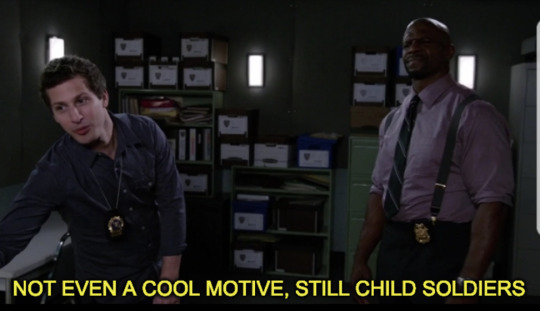
#trollhunters#tales of arcadia#mine#q&a#ask games#i understand that children's media has things happen to child protagonists for reasons outside any potential adult audience#but an adult coercing a child into permanent irreversible body modification#culminating in a scene that is pretty suicide-coded (for a pg show)#(not to mention. then. muscling that child into killing one of that adult's political enemies)#it just hits Bad u know!!#if merlin was strong enough to fight morgana why on earth couldn't he have swatted gunmar on the way
16 notes
·
View notes
Note
would you mind talking more about bart and unreliable narration? I always hear people say unreliable narration but I've never seen any concrete examples from media I actually consume so I'd love your thoughts
Oh absolutely!! I actually wrote a thing about this a while back but then went 'this is not well written' and it got buried in my drafts, so I’m glad to have an excuse to pull that up and rewrite it. (Also sorry, this got really long.)
Basically, at one point I was listening to a podcast (Be the Serpent, ep 4), and they categorize different kinds of unreliable narrators into three types: the narrator who knows they are lying to you, the narrator who is lying to themself (and therefore you), and the narrator who is lying because they are missing some key information. I would argue that the three main pov characters of the Bartimaeus Trilogy each represent a different type of these unreliable narrators.
Going in backwards order, Kitty is the narrator who lies because she is missing some key information, at least until the third book. As a commoner, even one who is part of a resistance movement, her knowledge of magic is extremely limited and biased. Were we to go off of her point of view alone, we would get an inaccurate view of this world and the power dynamics that exist within it: that magicians are somehow special in holding magic and that they have evil demons who work alongside them in shared mischief/hunger for power/whatever.
However, because the books include other points of view, the full impact of that unreliability is not realized.
Similarly, Nathaniel lies to himself, especially in the later books. He ignores how much he personally contributes to upholding a system that depends on the oppression and slavery of other sentient beings, and squashes down the last traces of his moral compass. I don’t think he ever really questions the system of government or if it should be there and work the way it does.
To some extent, we do see through his unreliability as well, because Bartimaeus is around to keep a check on him and tell the reader that no, the magicians and their imperialism are bad, that spirits have very good reason to hate humans, and give us other world building details that contradict what Nathaniel believes.
But some of it is about what is going on inside Nathaniel’s own head, so there is also a lot that can’t be fully seen by an outside perspective that has to be assumed by the reader. Like he will deny the sentimental feelings he has towards Ms. Underwood and the guilt he had over Kitty’s supposed death and the fact that he even remotely cares about Bartimaeus, but actions speak louder than words.
Because both of these characters’ unreliability stem from a lack of understanding, having other perspectives in the book in some ways cancels out their unreliability, and actually ties their unreliability more to their character development than as a plot/narration device. Kitty grows more reliable throughout the series while Nathaniel gets less so until the end. This doesn’t make that unreliability useless though, especially in a series aimed for children. By getting each character’s point of view, we can see where they are coming from and how the knowledge and views they have affect the way they act, but there is also someone else to point out how they are wrong, to make you question how true what each individual says is.
Bartimaeus is entirely different from the first two characters. His narration is told in first person, unlike Nathaniel and Kitty’s third person. He talks directly to the reader and goes off on tangential footnotes that are not necessarily part of the events currently happening in the story. Because of this narration style, he also has the power to lie more directly to the reader than any of the other characters.
Given his life, it is understandable how he has gotten into the habit of lying. Every moment of his existence on Earth is spent under the power of someone else, so he lies in order to protect himself. There are some instances where he lies to his masters in order to escape punishment or to lead them into danger so he can be set free, but he also lies about his feelings because he cannot afford to be emotionally vulnerable.
For the most part, I think it can be assumed that the dialogue and most actions that happen in his pov chapters are told as they are, since much of that lines up with what goes on in the other characters’ perspectives, and also there are at least a few things that show him in a less-than-flattering light that he would probably leave out or change if he could. Instead, the lies he tells are largely about his past and his emotions, often done through exaggeration or omission, and cannot be collaborated by others.
When lying about his past, Bartimaeus frequently exaggerates his prestige and role in history. In Ptolemy’s Gate, Bartimaeus says that he talked to King Solomon about Faquarl’s tendency to brag about his historical importance. Even beyond the obvious irony, in the prequel we see Bartimaeus’s time at Solomon’s court, and while it isn’t technically impossible for him to have talked to Solomon about Faquarl, the timing and circumstances make it extremely unlikely. Although his other stories cannot be proven or disproven with what we know, this instance and his general tendency to brag outrageously makes it very likely that Bartimaeus at the very least embellishes.
However, despite being super showy about his past, Bartimaeus doesn’t actually include much important information. He very rarely talks about his great feats as a thief or assassin or anything else. When he lists his accomplishments, he describes building walls and talking to important historical figures. There’s a post somewhere (if I find it, I’ll link it) that explains this as being a way for Bartimaeus to try to take control of his reputation and therefore his life; by associating with safer jobs, he is less likely to be summoned for very dangerous and morally reprehensible jobs.
He does generally try to portray himself as clever and collected and just generally more cool than he actually is. There’s a moment at the end of the first book where he describes himself as trying to calm Nathaniel who is freaking out, and then the next chapter is from Nathaniel’s pov which describes him as being the calmer one while Bartimaeus is a fly anxiously buzzing around.
I don’t remember the exact line, but in the second book there’s an exchange that goes something like this:
“____” I said calmly.
“Stop your whimpering,” Kitty said.
The way Bartimaeus portrays himself is straight up contradicted by the more factual account of the words and actions of someone else. And presumably there are plenty of other times that we do not see contradictory evidence where Bartimaeus straight up lies about how he is reacting to something.
But one of Bartimaeus’s most unreliable points centers around humans. Throughout the books, he constantly talks about the ways he has killed and would like to kill his masters, if given the opportunity. Nathaniel is an exception, one that Bartimaeus does admit to the reader, but even in the third book when he talks the most about how he would kill Nathaniel or even join a demon rebellion if Faquarl offered right then and there, Bartimaeus does not actually follow through on these threats when he gets the chance. Despite all of his talk about how much he hates humans, Bartimaeus has as much of a positive relationship he can have with as many humans possible, given the circumstances.
A lot of his unreliability centers around Ptolemy, which is what some of Bartimaeus’s biggest lies of omission are about. In the first book, we do get the sense that Bartimaeus has a soft spot for at least some humans. His excuses of saving and looking after Nathaniel in order to avoid Indefinite Confinement, while likely not entirely false, do fall a bit flat. We even get a mention of “a boy I had known once before, someone I had loved.” Although this is not explicitly connected to Ptolemy at this point, mentions of brown skin and the Nile make a pretty obvious connection to Ptolemy, especially as Bartimaeus describes taking on Ptolemy’s form several times later on. There is a less obvious hint too, “I sat on the ground, cross-legged, the way Ptolemy used to do.” Even without knowing much about what kind of relationship Bartimaeus had with Ptolemy, that kind of detail shows ‘a devotion to detail that could only come with genuine affection, or perhaps even love.’
It isn’t until the third book until we learn anything substantial about his relationship with Ptolemy, and even then he doesn’t tell the whole story. The fandom jokes about how Bartimaeus just casually mentions in a foot note that he prefers a lioness form because the manes are annoying, and it’s not until the flashback that you find out that the mane is part of what got Ptolemy killed. And even with the flashbacks, you still never see the time that Ptolemy visited the Other Place.
There are a lot of posts on this site that talk about how Bartimaeus absolutely was idealizing Ptolemy, and how there’s some evidence that he isn’t the perfectly sweet never-did-anything-wrong innocent child that Bartimaeus describes him as (notably that part where he was vaguely annoyed that people kept coming to him to ask for help and interrupted his research). Not that Ptolemy secretly sucks or anything, but it’s really easy to let nostalgia skip over the less dramatic details of Ptolemy being an actual human being with flaws.
In summary, I would argue that all of the trilogy protagonists are unreliable narrators to varying extents, and Jonathan Stroud is a genius for how he manages to make it all work.
170 notes
·
View notes
Text
My Top Ten Overlooked Movies With Female Leads In No Particular Order
Note: When you see this emoji (⚠️) I will be talking about things people may find triggering, which are spoilery more often then not. I mention things that I think may count as triggers so that people with them will be aware before going in to watch any of these.
Edited: 3/16/21
Hanna (2011)
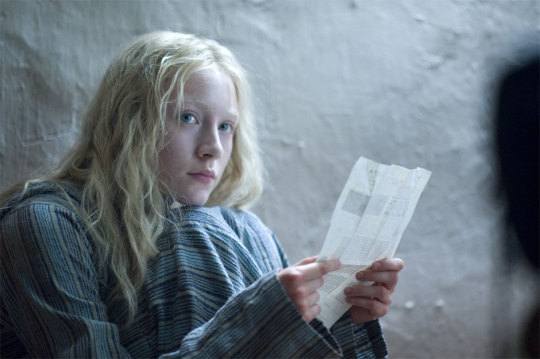
So, before I get into why you should watch this movie, I just want to take a moment to say why it's near and dear to my heart. Growing up as a queer kid in the early 2000s, seeing portrayals of people like or similar to myself on anything was rare at best. It was mostly in more "adult" movies or shows that my parents would occasionally let me watch with them that I'd see any lgbtq+ rep at all. Often times they were either walking stereotypes, designed to be buried, evil, or all three.
Then here comes this PG-13 action thriller with a wonderfully written main female lead who, at the time, was close to my age, and who got to kiss another girl (her very first friend, Sophie) on screen in an extremely tender and heartwarming scene. To say the least, it was a life changing moment for me personally.
Now that I've gotten that out of the way, Hanna is a suspenseful movie about a child super-soldier named, you guessed it, Hanna (played by Saoirse Ronan) and her adoptive (?) father Erik Heller (played by Eric Bana) exiting the snowy and isolated wilderness of their home and taking on the shadowy CIA operative, Marissa Wiegler (played by Cate Blanchette) who wants Erik dead and Hanna for herself for mysterious reasons.
It also has an amazing soundtrack by the Chemical Brothers, great action scenes, and it has an over arching fairytale motif, which I'm always a sucker for.
⚠️ Mild blood effects, some painful looking strikes, various character deaths, and child endangerment all feature in this film. However, given its PG-13 rating, a majority of viewers are presumably able to handle this one. Still, be aware of these going in.
Sidenote: It's recently gotten a TV adaptation on Amazon TV, although I have not watched it, and do not know if Hanna and Sophie's romantic/semi-romantic relationship has transferred over.
A Simple Favor

A Simple Favor is a "black-comedy mystery thriller" centered entirely around the relationship between two mothers, the reclusive, rich, mysterious, and regal Emily (played by Blake Lively), and the local recently widowed but plucky mommy blogger, Stephanie (played by Anna Kendrick). When Emily suddenly goes missing, Stephanie takes it upon herself to find out what happened to her new best friend.
It's a fantastic and entertaining movie throughout, with fun, flawed and interesting characters. The relationship between the two female leads is also implied to be at least somewhat romantic in nature, and they even share a kiss.
⚠️ The only major warnings I can think of is that the movie contains an instance of incest and one of the main plotlines revolves around child abuse, although both of these potentially triggering topics are not connected to each other, so there is thankfully no csa going on.
Edit: I legitimately forgot there was drug use in this movie until now. So, yeah, if that's a trigger, be careful of that.
I Am Mother
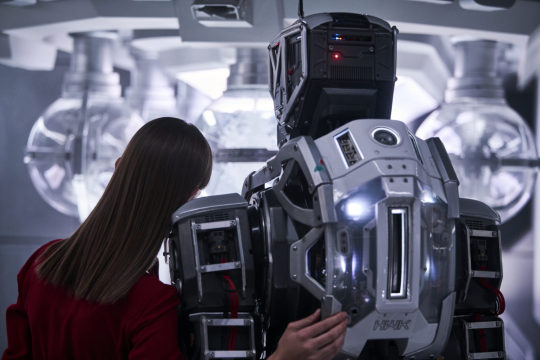
I became mildly obsessed with this movie when it came out. I Am Mother is a sci-fi film that centers entirely around a cast of two woman, and a female-adjacent robot who is brought to life on screen with absolutely amazing practical effects.
The plot is such, after an extinction-level event, a lone robot known only as Mother tasks herself with replenishing the human race via artifical means. She begins with the film's main protagonist, Daughter. Years go by as Mother raises her human child and the two prepare for Daughter's first sibling (a brother) to be born. However, on Daughter's 16th birthday, the arrival of an outsider known only as Woman shakes Daughter's entire world view. She begins to question Mother's very nature, as well as what's really going on outside the bunker she and her caretaker call home.
⚠️ This movie features child endangerment and reference to child death.
Lilo and Stitch
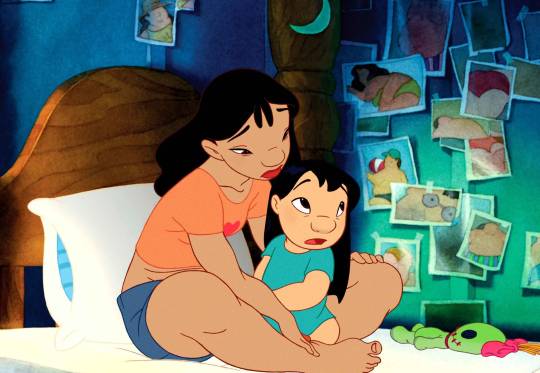
When I decided to add a single Disney film to this list I initially thought it was going to be hard but almost immediately my brain went to Lilo and Stitch, and specifically about the relationship between Lilo and Nani.
On the surface, this film is about a lonely little girl accidentally adopting a fugitive alien creature as a "dog," but underneath that the story is also about two orphaned sisters and the older sister's attempts to not let social services tear them apart by stepping up as the younger sister's primary guardian. Despite its seemingly goofy premise, Lilo and Stitch has a very emotional and thoughtful center. It's little wonder how this movie managed to spawn an entire franchise.
Despite the franchise it spawned (or possibly because of it), I often find that Lilo and Stitch is overlooked and many people only remember it for the "little girl adopts an alien as a pet" portion of its plot, and I very rarely see it on people's top 10 Disney lists.
⚠️ This movie could be potentially triggering to people who were separated from their siblings or other family members due to social service intervention. There's also a bit of child endangerment, including a scene where Lilo and Stitch both almost drown.
Nausicaä and the Valley of the Wind
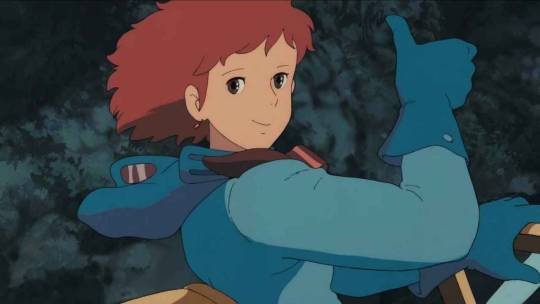
Unlike the above entry, I did struggle a little bit with picking a single Studio Ghibli film. Most media of the Ghibli catalogue have strong, well-written, unique, and interesting female leads so selecting just one seemed like quite the task.
However, I eventually settled on this particular film. In recent months, Princess Nausicaä has become my absolute favorite Ghibli protagonist and I'm absolutely enchanted by the world she lives in.
Set in a post-apocalyptic world overun by giant insects and under threat of a toxic forest and its poisoness spores, Nausicaä must try to protect the Valley of the Wind from invaders as she also tries to understand the science behind the toxic forest and attempts to bridge the gap between the insects and the humans.
For those who have never seen the film, I think Nausicaä's personality can best be described as being similar to OT Luke Skywalker. Both are caring, compassionate, and gentle souls who are able to see the best in nearly anyone or anything. She's an absolutely enthralling protagonist and after rewatching the film again for the first time in well over a decade she has easily become one of my all time favorite protagonists.
Whenever I see people talk about Ghibli films, they rarely mention this one, and when they do mention it, it's often in passing. In my opinion it's a must watch.
⚠️ This movie contains some blood, and the folks who either don't like insects or who have entomophobia may not appreciate the giant bugs running about throughout the movie. (Although most insects do not directly relate to real life bugs, and are fantasy creatures).
A Silent Voice

A Silent Voice is an animated movie adaptation of a manga of the same name. While I've never had the pleasure to read the manga, the movie is phenomenal. It covers topics such a bullying, living in the world with a disability, the desire for atonement, social anxiety, and depression in a well thought out manner that ties itself together through the progression of the relationship between its two leads, Shoya and Shouko. It's also beautifully animated. Although very popular among anime viewers, I've noticed that it's often overlooked by people who watch little to no anime. So I suppose this is me urging non-anime viewers to give this film a chance.
⚠️ As mentioned above, the movie deals with bullying, anxiety, and depression (with this last one including suicidal thoughts and behaviour). If discussion of those topics are triggering to you, than you may want to proceed with caution or skip this movie all together.
In This Corner of The World

Another manga adaptation, this one taking place during WWII-era Japan. In This Corner of The World follows the life of a civilian Japanese woman, Suzu Urano, as she navigates simply living and her new marriage as the wartime invades nearly all aspects of everyday life. I think this movie is a good representation of what it must be like to be living as civilian in a country at war where the fight is sometimes fought on one's own soil. It was also an interesting look into pre-50s Japanese culture in my opinion. It's also beautifully animated featuring an art style I don't see often.
Despite it being well known among anime fans, I never really see it be brought up, even among said anime fans themselves.
Side note: I've seen many WWII dramas centering around civilians but they've almost always been about American or UK civilians. This was the first movie I'd seen that features the perspective of a Japanese civilain.
⚠️ Features the death of a child and limb loss. There's also a disturbing scene featuring a victim of one of the atomic bombs near the end.
Wolf Children: Ame and Yuki
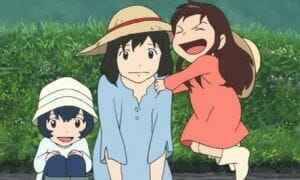
This film follows Hana, a Japan-native woman who fell in love with a magical shape-shifting wolf-man, and her trials with raising their children, who can also magically shape-shift into wolves, on her own. It's a very heartfelt movie about a mother's love and the struggles of doing right by your children when you have limited resources to actively guide and care for them. All the characters feel unique and alive in my opinion. Also, the animation is so good that my sister and I initially mistook it for a Ghibli film.
Again, like the previous two anime entries, I don't see it ever brought up outside of anime circles.
⚠️ There's some child endangerment present in the film, although none of it is the fault of Hana as far as I can remember.
Roman Holiday
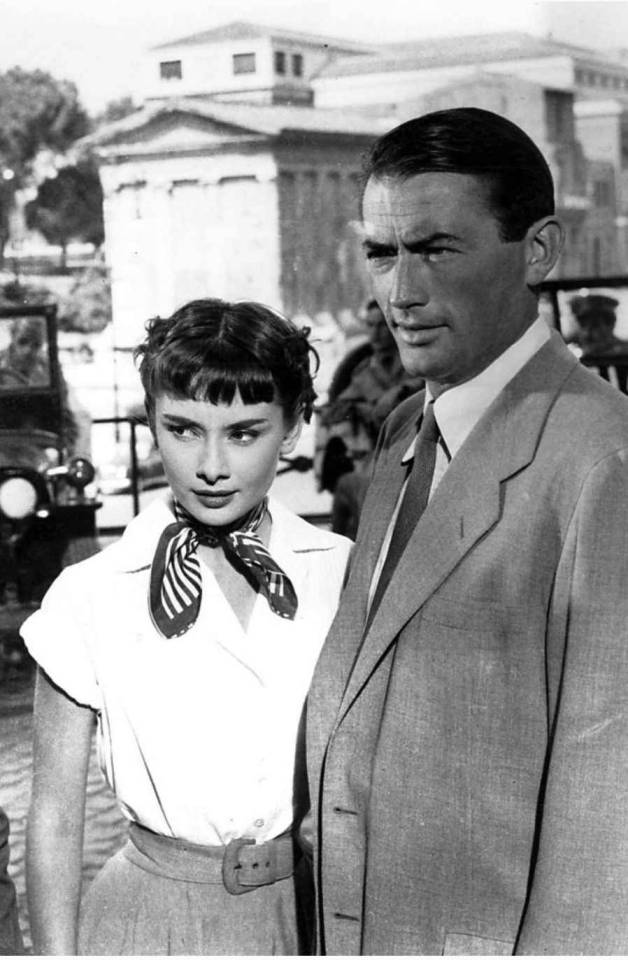
Roman Holiday is about the fictional Princess Ann (played by Audrey Hepburn), who while on a whirlwind tour of Europe, finally reaches her breaking point over having her entire life be one big schedule and all her words and actions being rehearsed. In the spur of the moment, she runs away in hopes of experiencing what life is like for other women. Unfortunately, she was previously given a sedative, meaning she doesn't get too far before it takes effect. Fortunately, she is found by the kind reporter Joe Bradley (played by Gregory Peck). Believing her to be drunk and unable to get an address from her (because she has none) he ends up taking her home for safety's sake and allows her to sleep off her suppose drunken stupor. The next day, he realizes who she is, and decides to take her on a fun sight seeing trip across Rome in hopes of getting the big scoop. Along the way, they begin to fall for each other.
This is my favorite black and white, old romance film. I think the relationship between the main characters is absolutely beautiful and I have a lot of fun watching it.
⚠️ I'm not entirely sure what kind of warning this film would need. However, it was released in 1953, so values dissonance will probably be at play for many viewers to at least some extent. For example, early in the film Ann is given sedation drugs by her doctor for her behavior, something that is very unlikely to happen today. Also, Mr Bradley deciding to take Ann home to keep her safe rather than call the police or an ambulance is a very pre-90s decision in my opinion.
#hanna 2011#a simple favor#i am mother#lilo and stitch#nausicaä of the valley of the wind#a silent voice#in this corner of the world#wolf chilren ame and yuki#wolf children#roman holiday#black and white film#anime#disney#studio ghibli#movie recs#top 10
177 notes
·
View notes
Text
On cats. (Vincent and Alice meta)
Something went wrong when you were born. There was some kind of mistake, some earth-shattering cosmic screwup that resulted in your creation. Nothing can be done about it- that mistake is who you are, something inseparable from the core of your being. Humans must scorn you, or else be made to suffer. You know that. No one will let you forget it.
Supposedly, you’re surrounded by people like you. They find camaraderie in each other, share each other’s pain so no individual is given too much to bear. Supposedly, supposedly they’ve all been tossed aside, declared too sinful to be tolerated by humans, and supposedly that means you’re all family and you’re all friends. They don’t like you, though. You’re a step further.
Who’s there to care for you? Your sibling, in a sense, but also not- they know what you are and can’t ever really forgive you for it. They love you, in their way, and then also love the one who put you there, who tells you your life is forfeit and approaches you intending to one day have you killed. Nothing can be done about it. To go against him would doom you both.
There’s one person, though, just one person who seems to care for you. He’s not like the others- he’s from the outside, where he says he’ll take you someday, away from the family that scorns you. This person is gentle and warm to you in a way no human has ever been, says you’re pretty, says you’re kind, says he loves you. You love him religiously, of course, since it’d be a saint that could love something as hateful as you.
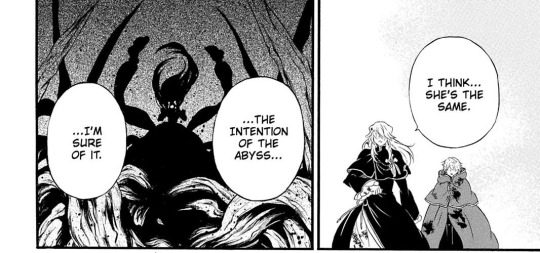
(chapter 103)
There’s someone just like you out there. You hate them.
The first bit of information we’re given about Alice and Vincent’s relationship is delivered in the most shocking way possible- Alice, fawned on by Jack and caught in the sort of innocent infatuation one would expect a young girl to have, is approached by Vincent. Immediately she identifies him as an enemy, talking of how she hates him for how he bullies her. Then he shows her her cat, presumably Alice’s only real friend, whose eyes he’s gouged out. (chapter 31)
It’s something I see PH fans talk about a lot, often with the perspective that it’s proof of how Vincent had always been evil. That’s understandable. The setup of a protagonist whose only companion is a cat, otherwise bullied an isolated, then having their cat be brutally murdered is common in Japanese media (think of Mob Psycho 100, Mahou Shoujo Site, and Misao as examples from different genres and mediums). It’s a very easy way to garner sympathy for a character and to demonstrate the degree of their helplessness. What Vincent had done seemed, when it was first shown, to be an act of needless cruelty.
What Vincent had done was wrong. In no way do I attempt to argue that there’s any justification for animal cruelty, especially to the degree that he had committed. The issue I take here is in how many refuse to take into account the full context of their relationship, one I think is extremely important to understanding both characters. Pandora Hearts is a series whose structure largely relies on going back over the same events from different perspectives, with new information- information that more often than not completely changes the meaning of the events previously shown- displayed each time.

(chapter 39)
Here’s the thing about children- they only know what’s been shown to them. A child that’s been violently abused will not understand the immorality of violence. A child that’s only been shown cruelty will not understand the problem with being cruel. Here’s Alice, told from birth she was dangerous, that she was to be held in isolation and abused, ostensibly for the greater good. Here’s Vincent, told the same thing. Here’s Gil, who wants to kill Alice now, because Vincent needs Gil, needs Gil to protect him from Alice who’s being cruel to him now, and if Gil can’t make Vincent need him, what point is there in Gil being alive?
She makes Gil wear that expression again because of me. It’s worth noting, Alice is gleeful to hear Gil was going to be murdered after Gil threatens and physically assaults her. Vincent was the only child in that scenario who seemed to have no interest in the death of another.
From the beginning of their relationship there’d been a mutual understanding between Alice and Vincent of each being, in some way, interchangeable with the other. It’s why Alice mocks Vincent to begin with- a defensive anger out of the perception that Vincent intended to steal Jack away when Jack was all Alice had. Vincent felt no anger towards Alice for the things she said to him, but Gil’s reaction to them- he recognized his anger at her as being, in a way, a product of Gil’s emotions towards Vincent. The thing about hating yourself is you start to hate anything that looks like you, too.
Alice and Vincent’s respective cruelties were that of children, meaning, ultimately, they were that of adults. Both had been abused and dehumanized by their family and then groomed by Jack, who encouraged conflict between them knowing it would drive them both further into helplessness and isolation. I have no intention of debating whether either deserved it (neither did) nor if one traumatized the other more thoroughly (does it even matter?). I am stating plainly: Alice and Vincent, who were abused children, both treated each other horribly, as they were abused children.
(Do not try to argue that Vincent should have found another outlet. He was an abused and dehumanized eight year old who fully believed his guardian intended to kill his brother. If Vincent had a healthy outlet, he would not have any conflict with Alice to begin with.)
There’s something very important to consider when discussing both Alice and Vincent’s abuse- the fundamental reason as to both why they connected with one another in the way they did and why they were abused in the first place. In fact, it’s the common factor in their connection to Jack, why he had been interested in them in the first place, as they would both eventually find out.

(chapter 72)

(chapter 103)
It’s Lacie. Their connection is Lacie. The reason for their abuse, the reason for their grooming, their reason for their subsequent empathy and hatred for one another is their shared connection to Lacie. Both, for their resemblance to her, were isolated and dehumanized in accordance to the circumstances of their birth. Remember, had that tower not been occupied by Alice, it would’ve gone to the next Child of Ill Omen. It should have been Vincent’s.
The other important piece of knowledge to understanding Alice’s hostility towards Vincent would not be revealed until long after their confrontation is first shown. It further cements that their aggression towards one another was from their shared connection to Lacie, a sort of self harm by proxy between two children with no other means of expressing themselves.
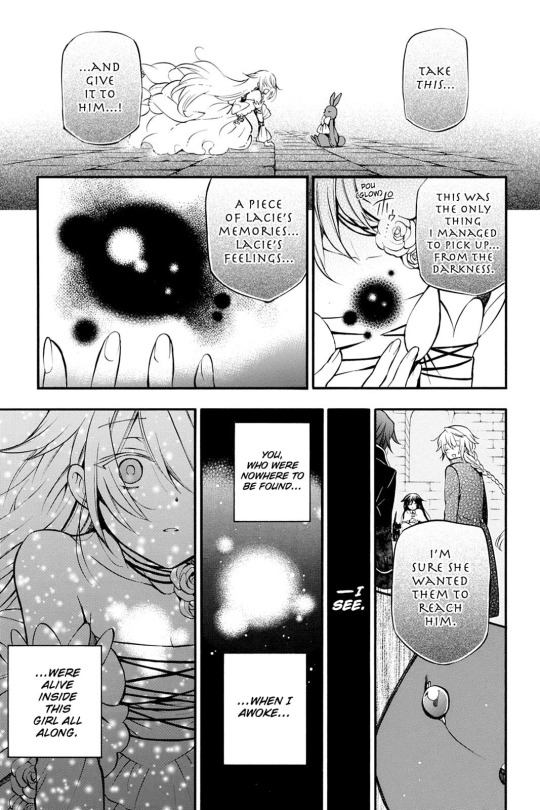
(chapter 71)
Alice knew.
She knew who her mother was, what had happened to her- someone told her, Core of Abyss or someone else. That Alice would know what happened to her mother and know the stigma surrounding the Child of Ill Omen but not understand what the two meant together is unlikely. Alice definitely understood the connotations of what she had said to Vincent- mocking him for being marginalized in a way that had caused him to suffer continuous, extreme abuse- and it’s likely she understood what those connotations meant in relation to herself.
If we assume she knew what happened to her mother- which she did- and assume she knew her mother being a Child of Ill Omen was the cause- which is likely- then her mockery of Vincent for being a Child of Ill Omen takes on a new meaning. Not only is it the recognition that she and Vincent were of the same cloth, similarly regarded as unwanted. It is the recognition that Vincent is the same as that which had birthed Alice to begin with. She implicitly blames him for her creation.
Vincent hates Alice. He hates Alice for hurting Gil. He hates Alice for upsetting Jack. He hates Alice for having caused the Tragedy of Sablier, for have created the circumstances which led to Jack’s death. In the second to last chapter, Vincent says he is sure that he and Alice are the same.
(Consider reading my meta on Vincent and Miranda.)
#pandora hearts#vincent nightray#alice baskerville#meta#logxx#logam#ph spoilers#How to tag this#Uhhhh#grooming#animal death#child abuse#vincent gender essays
59 notes
·
View notes
Text
Blessings, Curses, Autism
My earliest memories are of waiting rooms with musty carpets and buckets of donated, broken toys. I guess it was worse for my parents, who had nothing to stare at but walls and trashy lifestyle magazines. Eventually, the professionals decided I had a condition called Asperger’s Syndrome, and there was one thing they wanted me to understand:
“It’s a blessing, not a curse.”
If someone asked me to list blessings off the top of my head, I’d mention 20/20 vision, pitch-perfect hearing, or George Foreman’s chin — not a neurological disorder that transforms the most natural stages of personal development into a confusing struggle. In hindsight, I would have preferred more concrete advice than ‘it’s a blessing, not a curse.’ Something like:
“Watch out for the train!”
…But the quippy slogan is what stuck. My parents dispensed it like a cheap plaster, and I still don’t know whose benefit it was for — mine, or theirs. What I do know, is that I never once believed them: I felt I was being brushed aside, or told to accept something blatantly untrue. Besides, children don’t care to question whether they’re blessed or cursed, so it was an answer to a question that hadn’t been asked. Existentialism is for adults trying to make the best of a bad situation.
Being an Autistic Child.
Autism is not a superpower. Thanks to certain pieces of popular media, you might think of autistic people as quirky-yet-brilliant detectives, awkward-yet-sexy hackers (always female), or nonverbal children with a deep, instinctive connection to whatever animal or alien the protagonists are trying to communicate with. Often, people with severe autism are plot devices in the same vein as a forbidden orb or set of nuclear launch codes. Instead of damsels waiting for Bruce Willis to save them, they’re objects waiting for Bruce Willis to understand them.
A lot of autistic people are brilliant academically, though not for the reasons you might think. A common feature of autism is hyper-fixating on ‘special interests’, obsessing over a subject until one has learned everything about it, before moving on to the next. Very few people become maths geniuses this way; more often they become diehard Sonic fans or start giving lots of money to Games Workshop. Here are a few of the phases I went through:
- Thomas the Tank Engine.
- Pokémon.
- Old English monster myths.
- Naruto.
- Peter Jackson’s King Kong (both the movie and the video game).
- Bleach (the anime, thankfully, not the cleaning product).
Fairly normal interests for a young person, right? Now remember the hyper-fixation part. People with Asperger’s tend to focus on certain interests at the expense of others, and those ‘rejected interests’ are usually vital for social development. Now remember that high school is a psychopathic hellscape crawling with cruel little monsters ready to vent their newfound territorial instincts on anyone who doesn’t fit in. The kid who wants to discuss the depiction of brontosauruses in a sort-of-okay remake of a 1933 movie isn’t doing himself any favours — constant bullying drives him even deeper into reclusive interests and solitary hobbies, and from there, it’s the luck of the draw whether those hobbies resonate with any of the kids around him.
I’ve always known a lot about things no one knows about, and nothing about things everyone knows about. This, along with the fact that a lack of social life makes it easy to focus on one’s studies, creates the illusion that some autistic kids are eccentric geniuses-in-the-making. Parents — especially the parents of autistic children — are quick to latch onto any display of intelligence. They watch intently for any sign their long struggle is paying off, and when it happens, they praise their child endlessly, reinforcing behaviour patterns both good and bad. Because adults told me I was intelligent, I told other children I was intelligent, and you can imagine how well that went.
This misapprehension — confusing a bunch of random trivia for genius — followed me into high school, hurting me all the while, which is ironic, because it was the only positive way I could think about myself.
I’m lucky to have found books and writing as lifelong passions, but that almost didn’t happen; in fact, I used to despise any writing task the teacher set for me, to the point of outright refusing to do the work. In my defence, I was trying very hard to be somewhere else at the time — mentally, that is. The idea of putting my feelings on paper, for all to see? I couldn’t conceive of anything more terrifying.
Harry Potter changed things. I was gifted The Deathly Hallows when it was first published, and even though I had no idea what was going on in the story (I hadn’t even seen The Order of the Phoenix yet), I thought it was wonderful — maybe because I was getting a sneak peek into a future movie. Since then, I’ve always had a book close at hand, and it wasn’t long before I started writing my own novels (more on those another time).
Voracious reading was, technically, another un-social activity that would consume my waking hours, but at least it was productive. My grades improved dramatically. I got good at writing essays. I became better at expressing myself, and I started to consider other people’s points of view. I made friends, lifelong bonds. I wouldn’t say I was happy at that stage of life — bullies tend to push back against things like improved mental health — but at least I was growing.
Looking back, I can’t help but wonder how close I came to disaster. I was 13 or so. If I’d left it any later, I doubt the outcome would have been so peachy. There are plenty of autistic adults with no friends, no employable skills, no human contact but ageing parents and rare, fleeting therapy sessions. Many of these people are quirky and brilliant, but there’s no happy ending for them.
Being an Autistic Adult.
Autism never goes away. It never gets ‘better’. It isn’t curable because it’s not a disease, despite what the vaccine deniers might tell you; autism is an intrinsic part of my neurological makeup, and living with it is a process of compromises.
I had to accept, early on, that I’m not the same sort of human being as the people around me. My brain is a different brand of brain: it makes different connections, processes different bits of data at different speeds. Things that seem obvious to you, need to be explained to me. I struggle to read a room, and I’m never quite sure if the person I’m talking to would really rather I shut up.
Put simply, my childhood experiences made me keenly aware of myself as an outsider. I need to watch for people’s reactions to anything I say or do, all the while navigating a maze of social cues and left-unsaids — but sooner or later, I’m always going to slip up. When you are differently-brained, it’s easy to misinterpret instructions, or to misjudge which thread of discussion is most important; and when you’re processing so much data at any one time, small-yet-vital points are going to slip under the radar. The result is being told off, being laughed at (‘laughing with you, not at you’ is another fun slogan I’ve learned to endure), and generally feeling stupid or useless for overlooking one point of data among hundreds.
As I grew into an adult, I got better at performing normal. Nowadays, only those who spend a lot of time around me can spot the signs of my condition: I seem confident, funny, sympathetic, and I make friends easily. As I write this, I can’t help but feel uneasy: it makes me wonder, and not for the first time, how much of my personality is genuine. In high-stress situations, the generic piece of advice is ‘relax and be yourself.’ Succeeding in life as an autistic person means learning not to be yourself, or at least creating a version of yourself that can exist in public — so, where does the real me end, and the performance begin? Are they one and the same? I’ll never know the answer to that question.
Being an autistic adult, then, means pretending I’m not autistic for the benefit of other people. It’s a lifelong, often exhausting performance, and the temptation to retreat into my shell is ever present. But, just like anyone else, I long for human contact, so the compromise is a necessary one.
Blessings & Curses: Redux.
Terry Pratchett wrote that humans need to learn to believe the little lies so they can believe in big ones. There’s something I wish I knew during the bad years; that I was far from the only person suffering from my condition. My parents were stumbling in the dark just like me, except they had to pretend everything was under control.
My dad confided in me, recently, how he used to cry — a lot — during those days when I would return from school after another worst day of my life, talking about footballs thrown at my head, being cornered and verbally abused, or being removed from class after another tantrum. These were practically daily occurrences, and they’ve left their lifelong marks on me, but I’ve never lacked for brilliant people willing to help, people who were alongside me in my suffering. Raising a child is hard, and raising a neurodivergent child is even harder. Can I blame my parents for wanting to believe in blessings, and not curses?
Most of the time, those bad years seem like a distant memory. I don’t see autism as my blessing or my curse; it’s just a part of me — a frustrating, limiting, often embarrassing part of me, but one just as vital as my eye colour or ethnicity. I’ve come to accept it and be content despite it, and I suppose that’s the best outcome I could hope for.
5 notes
·
View notes
Text
100 Days of Trump, Day 38: Why Are You So Angry?
Welcome back to 100 Days of Trump, where I try to recommend 100 works to help us understand WTF happened in 2016, and it should be increasingly obvious that I don’t actually plan these things out in advance because today’s recommendation is actually a little bit behind all things considered. I was hoping to move past the psychological state and into the “The system itself which makes all of this possible” state, but I remembered this video series and I want to talk about it, so Innuendo Studios. Its a video game channel that mostly talks about Indie Games and while all of that stuff is very cool and I recommend you check it out, I want to focus on his six part series on Gamergate called “Why are you so angry?”
youtube
Now I’ve said it before and I will say it again, to understand Trump you need to understand Gamergate and if it wasn’t for Gamergate, I honestly don’t think Trump would have gotten elected, within this bubble of internet gaming insanity we see the core of both Trump’s popularity, and the way he was able to win. And there is a lot to say about Gamergate, and a lot of it was covered in my earlier series talking about Assassins, or Taxi Driver, or The Wall, or Breaking Bad, or Pan’s Labyrinth, or, Protagonist, or Rope, and above all the Social Network, all talking about the misdirected rage and optimistic nihilism that characterizes the Gamergate and by extension Trumpkin crowd (and really they are the same people). So what does Innuendo Studios have to say which the earlier works don’t already say? Well, in his Why Are You So Angry series focuses on a specific sub set of the reactionary hate mob, not the guys who lead it, but the guys who serve as support for those who do, which he coins “Angry Jack”
youtube
Now I think it is important to understand that this video series isn’t actually summing up the whole movement, and the Angry Jack is just one small part of a larger WTF puzzle, so don’t take this video series as rite and go “OH well, I understands Gamergate/Trump Perfectly” not all of his supporters are Angry Jacks and Angry Jack are just one part of a larger system. But when it comes to this particular subject, he is unto something. The Ian Danskin posits that a core point of these movements is less malice than a form of ethical laziness, that sloth is the core sin of a lot of these reactionaries. People like things to be simple and things to be self serving, its human, and when outside information challenges stuff, it is easier to double down than think critically. To use a non political example, people who don’t drink at parties, I don’t drink by choice and a friend of mine doesn’t drink because it makes her head hurt, and a third friend doesn’t drink hard Liquor. When ever we are at a party, despite having very different reasons for not drinking (and one of us actually liking alcohol) a lot of strangers will react really hostilely to any of use refusing a drink equally, and the ones who drink the most react the strongest. Because they are assuming judgement to what is actually just personal preference. I don’t drink because I dislike drinking, I don’t subscribe a moral value to it, but people who meet me seem to preemptively make me into some sort of prohibition era strawman, and it is doubly absurd for my friends whose choice comes from a place of ‘I don’t want head aches” and “I like this alcohol but not that alcohol”. Because the people who get so pissy are terrified of judging themselves, so they try to create environments where nobody might do so.
youtube
Now this video series isn’t perfect, I do think his understanding of Christianity is ironically quite muddled and his belief of where this all stems from is frankly....dumb and juvenile, but look past that stuff and focus on his larger point, and you see why this is useful, a lot of this reactionary stuff is coming out of a sort of defense of one’s internal state of ignorance, that these people think they have found the loophole to living a morally good life without doing any work for it. Just don’t notice whenever bad things happens, look away and pretend the problem doesn’t exist. And the progressive movement is challenging that, it is effectively acknowledging problems that everybody knows exist. And in order to make everybody more comfortable with the situation, they lash out to create an environment where people don’t have to think about these complicated issues. Again, most people are lazy, cowardly, and stupid, and prefer it that way, anything that would make them not want to behave like that is legitimately scary if your goal in life is to be selfish and never have to be judged for it. Even for the less debased, there is the question of difficulty, and people want simple solutions to problems even if those don’t exist. I wish I lived in a world where parents didn’t sexually assault children, or if it happened it was done by creepy immediately evil people who I could call the police to instantly handle without any difficulties. But I don’t live in that world, I live in a world where it is extremely common and there aren’t obvious solutions. A lot of people prefer a fantasy of the first than the reality of the second. And this is why so many (but not all) reactionaries are weirdly positive towards the Civil Rights movements and the early feminist movements, because in their mind that was “When the bad thing ended”.
Small note, I don’t like how Ian uses the term sociopath, and I think it is very silly, but move on, focus on the larger point.
youtube
And this is why we need to understand the relationship between Angry Jack and the more open and direct reactionaries, because if you have encountered these people online, you notice that unlike the most dire hard Alt Rightists, they don’t openly say the white nationalist/MRA/homophobic rhetoric, they insist it isn’t there. They tune Trump out when he says some things, and tune in for others, and when they interact with Neo Nazis, they pretend they can’t see the obvious racist elements because they don’t want to confront the reality that they are allied with them. A lot of these vocal harassers online are internally terrified of confronting who they are or what they have become, and if they were ever in a circumstance where they could calm the fuck down, would be horrified by the people they call their allies. But they don’t want to face that, so they ignore it. This is what Fox News and other groups like that do for these people, they give them an out. Remember after that refugee child drowned and everybody briefly pretended they gave a shit about refugees and the Right’s hypocrisy on the subject of human rights was coming to the forefront? And then Fox turned it into a Refugee vs. Vet, when both groups are fucked over by their very policies? It isn’t suppose to make any sense, its suppose to be a life raft for the people who don’t want to think hard about the fact they are abandoning children to die. Or how about when Milo got caught advocating for the sexual abuse of children, and the Right’s response was to bring up Roman Polanski as a “left wing child rapist”, nvm the fact that the left has been attacking Polanski for decades now particularly feminist circles. Its a way to not think about the type of people they are allied with, for the average supporter think about this as an “US vs. THEM” argument rather than “Holy fuck, the guy I listened to thinks children should be raped...maybe all of the other things people said of him might be equally true....maybe this whole being cruel for the sake of humor thing is bullshit maybe the other side has a legitimate....oh wait, if I condemn Milo then THEY WIN and fuck THOSE PEOPLE (jews)” So they march behind actual nazis, and as Hannah Arendt noted, once this all blows over, they will be out there saying they had nothing to do with it and that the Nazis tricked/forced them into participating in these crimes.
For the record, I would divide Gamergate into more than two groups, rather Nine see here for my thoughts.
youtube
What separates the Angry Jack from the Nihilist MRA people we see in Assassins and Breaking Bad is that Angry Jack really needs to see itself as morally correct and most importantly, normal. They might use rebel rhetoric but they don’t see themselves that way, they identify themselves as just a dude, and really want to believe that feminism is nothing more than a few thousand rich college students or that the only white people who think racism is a problem are a couple dozen people who have been white guilt-ed into being puppets for the Black Panthers, they want to be the default, and are upset by the notion of having to accept a larger world. This is why the fact Clinton won the popular vote is so upsetting to these people, because they really want to believe that they are most of the country, that they are normal and are driving abnormal out of their larger political community, the alternative scares the shit out of them. And so much of this comes from my old enemy, simplistic easy morality, something which the left sadly has trouble with as well. Because the way we depict morality in so much of our fiction makes this mindset more powerful, it encourages the thought process that is so useful to the right. Because if our villains in works are nothing more than evil for its own sake, then we don’t have to think complexly about them, we don’t have to assume that their evil comes from a place and there are simple solutions to complicated problems. And the left should avoid this mentality as well.

Also how much of this battle is a fight for vindication, that these reactionaries are furious that society at large doesn’t respect them and doesn’t take their opinions seriously, and so they are screaming loud and more intensely out of the hope they will finally be recognized and respected for who they are...except that they aren’t because they are crazy. This is why Trump supporters are so angry at the media, because they won, they managed to get the most powerful job in the world, and yet people are still calling Trump and by extension them horrible people....because they are. And that is why they want to get ride of the Media, because they hope that they can create a reality where nobody criticizes their ideals, which ironically always makes it worse.
Finally since Tumblr only allows 5 videos per post, here is part 6, where Ian talks about how to deal with these problems This comes off as a tad naive today but it still applies, and this is why it is so important to try to keep people around you from buying into simplistic narrative, particularly because seemingly innocuous nonsense always gets co-opted by bigots and turn into a recruiting tool for the Alt Right. That is why these guys are so horrified by the notion of progressive politics making people happy, they find the notion that bioware games have gay relationships terrifying because the moment they acknowledge that is good, they start to validate the progressive arguments and they don’t want to go down that road. Hey, has anybody had something they need to do but they keep putting it off, and you can kinda live with that until a friend says “Hey weren’t you suppose to turn into those papers?” and you find yourself getting suddenly mad at them? Its that, because they don’t want to face the shitty part of the world, and if left alone, they will concoct a little alternate reality where they don’t have too, but they can’t do it if people keep poking the bubble. Remember, so much of this reactionary bullshit is coming from an emotional place of insecurity and is kinda pitiable if it wasn't for how many people they are hurting, and even as the left condemns and opposes them, we need to understand them, because otherwise we won’t be able to defeat them. And for all of their talk of how tough they are, they are remarkably thin skinned. But this is the most important thing, keep up the fight and keep attacking their arguments and proving them wrong, because while it doesn’t seem like you get any results, every time you do that, particularly when you conduct yourself in a more civil, mature, and above all intellectually honest way than your opponent, you keep a pupil form of an Angry Jack from joining up. They don’t say anything, they don’t comment and say “Thanks dude, your take down of that MRA made me reconsider my life choices’ instead they take that comment and it sticks with them later in life, and it makes it that much harder for them to make a pact with Neo-Nazis. And this is important, Gamergate and Trump seem inevitable now, but this is what matters,it took a lot of work for these movements to get started, /POL/ had been trying to get a Gamergate Going for at least three years before this one took off, and the Alt Right have been trying to get a trump going since the 1930s, it takes tremendous amount of effort to craft the sort of narrative to make this double think possible, and it took decades of work for them to make it this far. And if the left hadn’t gone with Hillary Clinton, it wouldn’t have worked, by choosing somebody as bad as Clinton, it provided them with the psychological tools they needed to rationalize supporting Trump, which wont’ be true if we go with somebody with less of a dark past. “They go high, we go low” actually does work, its just that Clinton didn’t go high, she stayed in the middle. And the more pressure we keep up on them, the more their movement frays. They seem powerful now, but this current state of affairs is on a very weak wedge, and it can come crashing down on them in an instant. The only way they can keep this up is if we either give up, or support morally debased responses to them.

#100 Days of Trump#Innuendo Studios#Gamergate#Why are you so angry#anita sarkeesian#Zoe Quinn#Donald Trump#Alt Right#/Pol/#feminist frequency#milo yiannopoulos#Arthur Chu#Angry Jack#Ian Danskin#amazing atheist#Thunderf00t#sargon of akkad#Mundane Matt#susan faludi#Backlash#Ronald Reagan#privilage#Just World Fallacy#Red Pill#Roman Polanski#Hannah Arendt#totalbiscuit
13 notes
·
View notes
Link
OFFICIALLY, AIMEE MOLLOY’S debut novel, The Perfect Mother, is a thriller. You might call it “grip-lit,” a new term for an old thing: a good suspense novel by a woman. More accurately, by a woman and for women, which The Perfect Mother certainly is. We’ll come back to that part, but first, I don’t think this novel is a thriller at all. To me, it’s a horror story.
First, there’s the visceral horror of the plot. A group of Brooklyn parents who call themselves the May Mothers (there’s one dad; the moms nickname him Token) go out for a drink one hot July night, most leaving their babies for the first time. They’re two drinks in, just starting to relax, when one gets a frantic call. She’s asked Alma, her nanny, to babysit for the group’s one single mother that night. Alma put the baby, Midas, to sleep, and all seemed well — until she went to check on him and he was gone.
Soon, Baby Midas is a cause célèbre in New York. There are prayer vigils, press conferences, and magazine covers about Midas and his mother, Winnie. A cable host named Patricia Faith begins a round-the-clock campaign against Winnie, her friends, and any other mother who has the gall to leave the house before her child turns five. There are prayer vigils in Prospect Park, middle-aged women waving flyers that announce, “Child neglect is a crime,” then cite Isaiah: “Can a woman forget her nursing child, that she should have no compassion on the son of her womb?”
Meanwhile, the rest of the May Mothers are frantic with guilt and fear. Guilt because they lured Winnie out for a drink and persuaded her to stop looking at the baby-monitor video on her phone — or, as Patricia Faith would have it, to “forget her nursing child.” Fear because they all went out, too. They all left their babies. Who knows why this happened to Winnie, not to one of them?
That’s the first horror: the it-could-happen-to-anyone kidnapping, the baby there one second and gone the next. The second horror is sneakier, and more interesting. Every woman in The Perfect Mother is haunted, and hunted, by the pressure to be exactly what the title suggests. The protagonists, Nell, Colette, and Francie, can’t go outside without strangers weighing in on their bodies, careers, and lives.
The opinions about what a mother should be come first and foremost from the media. There’s Patricia Faith and her prayer ladies, a smarmy New York Post reporter named Elliott Falk, and Nell’s boss at a thinly veiled Condé Nast. In one brilliant scene, Nell suggests that the company’s flagship magazine, Gossip!, “rise above” the Baby Midas scandal, and her boss snaps back, “Rise above it? That’s not our job, Nell. Our job is to create it.”
There are plenty of opinions closer to home, too. Each chapter opens with an email from a Brooklyn parenting network called The Village, which sends perky little reminders to hire a lactation consultant, walk off your baby weight, and start having sex with your partner again. The protagonists’ mothers tell them what to do: Baptize your baby! Go back to work! The May Mothers compete overtly with each other, exchanging homeopathic tips and displays of vulnerability like currency. Even Nell’s piggish boss has ideas about how a mother should be: he makes her return early from maternity leave, then shames her for gaining weight and missing her child.
It’s not news that when women become mothers, a whole new world of judgment snaps open. On a recent post on the fashion blog Man Repeller, the site’s founder, Leandra Medine, writes that after the recent birth of her twins, “I’ve noticed an uptick in the number of negative comments that populate my pictures. ‘Put your phone down and be with your babies,’ they will say.” You don’t need to look far — or try to look at all — to hear and read about experiences like this.
Of course, the idea of motherhood is always waiting for me. I’m 26, straight, Jewish. Every person in my life expects me to have children; I expect it of myself. And I want to, which is different, and less explored. The Perfect Mother doesn’t explore it at all. This is fundamentally a novel of expectations. In its characters’ world, wanting children — having always wanted children — is assumed. Colette, the only May Mother who didn’t get pregnant on purpose, admits to Winnie, “I called the whole thing a mistake for months. I’m excited now, but it’s been a process. I was not ready for her.” As she says this, she thinks of “the other women [in the group], who all seemed as if they’d spent their whole lives just waiting to become moms.”
This is true of the kidnapper, too. She’s a woman driven insane by expectations — her own and everyone else’s. She’s so desperate to be a perfect mother that she ends up possessed by perfection. She hallucinates, dissociates, commits terrible crimes in its service. And for a long time, no one can tell. Her friends find her performance of motherhood intimidating, and to the rest of the world, she’s just another Brooklyn mom with her stroller, going to baby yoga, popping probiotics, doing it right.
Horror stories rely on this dynamic. There has to be a character who’s haunted, or possessed, or stalked by some evil force, and the world around that person has to be unaware. The whole genre would be ruined if everybody believed in demons and ghosts. If Jack and Wendy in The Shining trusted their son’s premonitions, they wouldn’t stay a single night in the Overlook Hotel. In Jac Jemc’s recent novel The Grip of It, a couple moves into a haunted house, then lets their marriage dissolve rather than acknowledge the haunting. Carmen Maria Machado’s gorgeous “Horror Story” has the same premise, but in her version, the couple stays — the most relatable reason — because “the landlord had rented us a haunted house for above market rent and we didn’t have the money to move.”
In the Biblical story of Legion, which I’ve always considered the original horror story, Jesus encounters a man who’s possessed by a violent legion of demons, or else by a violent demon named Legion. He drives the demon(s) from the man into a herd of pigs, which immediately runs off a cliff. Afterward, the people in the town where the man lives aren’t grateful. They “plead with Jesus to leave their region.” He’s just saved them from a threat both spiritual and physical, and they can’t stand to face him — or face what he saw.
The demons in The Perfect Mother are not literal. But a demon is always a metaphor — those suicidal pigs in the Gospel of Mark aren’t important as pigs. The ghosts in the Overlook Hotel matter less than Jack Nicholson chasing his wife with an ax. It’s enough for the woman who kidnaps Midas to be driven by the pernicious ideal of perfection, something that came from outside her but to which she gave a home.
The Perfect Mother is a novel about internalized sexism, specifically as it relates to motherhood. And I do mean motherhood, not just privileged, gentrified Brooklyn motherhood, though I wish that weren’t the book’s context. The Perfect Mother could have been set nearly anywhere else in the United States, and should have been. Still, I hope its message will resonate as far past Park Slope as Molloy clearly intends it to. She seamlessly integrates commentary on the wage gap, on unpaid maternity leave, on male abuse of power in the workplace. Each protagonist has a demon of her own to fight, and with it, a new angle on the fundamental question of how a woman can reject the world’s beliefs about who she should be.
My favorite version of this is Colette, a ghostwriter married to a rising literary star. When the novel starts, she’s unhappily behind on a project her husband, Charlie, won’t take seriously. A few years ago, she ghostwrote a memoir for a charismatic young teacher who is now mayor, and he wants a follow-up. It’s going to be targeted at book clubs and at the “middle-aged women standing in line [at the mayor’s favorite diner], hoping to spot him at a table in the back,” and of course, it’s going to be a best seller. Charlie, though, couldn’t care less. Colette mentions that her deadline is a month closer than his, and he responds, “I know, baby. But you know what’s riding on mine.” To me, that would be grounds for a shrieking fight, but Colette just nods and agrees. Skip forward 100 pages, and she’s selling a novel to Charlie’s publisher.
I’m not going to give away everyone’s story line. Suffice it to say there’s a good Monica Lewinsky parallel, some enjoyable commentary on celebrity, and a few stories of heartbreaking sexual exploitation. There’s an underdeveloped but crucial arc for Alma, the nanny who was there when Midas vanished, whose immigration status and ability to raise her own child are threatened by the media frenzy around the case. And there’s Francie, who only needs to learn to speak up for herself. When the novel begins, she doesn’t even know that could be her goal. By the end, she’s the hero.
Francie shouldn’t need Midas’s disappearance to teach her how to speak up. Colette shouldn’t need it to understand the scope of her ambitions, nor Nell to argue with her sexist boss. This, I suspect, is Aimee Molloy’s agenda. She uses the drama of a kidnapping plot to shake readers awake. Her real goal is to show us the demons of motherhood in broad daylight, to make us admit the house is haunted. In Machado’s “Horror Story,” she’d be the psychic who comes over and opens the dryer, “which caused her to snap into the air like she was hanging from an invisible crucifix and recite something in a language we didn’t recognize, but which sounded unfathomably ancient.” After that, you can’t pretend there’s nothing going on.
I promised I’d return to the claim that The Perfect Mother is for women. I meant that. What I did not mean was that this is a novel for only women to read. It’s a novel written to champion women. It’s a powerful reminder that the consequences of telling a person who she is can be deadly. The Perfect Mother is set to be one of the year’s biggest crime novels, as well as a film starring Kerry Washington. I hope it keeps a whole nation of advice-givers awake all night.
¤
Lily Meyer is a writer and translator living in Washington, DC.
The post Aimee Molloy’s Maternal Horror appeared first on Los Angeles Review of Books.
from Los Angeles Review of Books https://ift.tt/2sS2MwI via IFTTT
0 notes